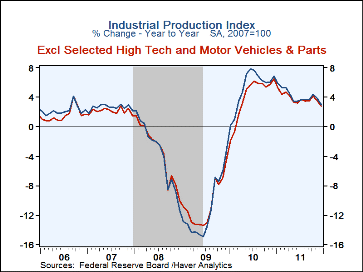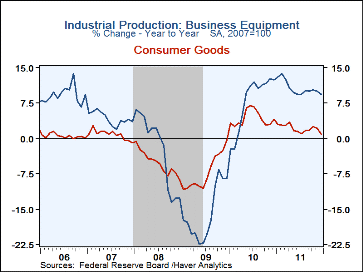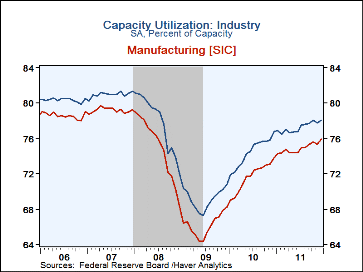 Global| Jan 18 2012
Global| Jan 18 2012U.S. Industrial Production Rebounds M/M But Trend Gain Slows
by:Tom Moeller
|in:Economy in Brief
Summary
Industrial production recovered 0.4% (2.9% y/y) during December following an unrevised 0.2% November slip. The latest gain roughly matched Consensus expectations, according to Action Economics. Factory sector output rose a stronger [...]
 Industrial production recovered 0.4% (2.9% y/y) during December
following an unrevised 0.2% November slip. The latest gain roughly matched
Consensus expectations, according to Action Economics. Factory sector
output rose a stronger 0.9% (3.7% y/y) and reversed the 0.3% November slip.
Utility output fell 2.7% (-6.6% y/y), down for the fifth straight month.
Industrial production recovered 0.4% (2.9% y/y) during December
following an unrevised 0.2% November slip. The latest gain roughly matched
Consensus expectations, according to Action Economics. Factory sector
output rose a stronger 0.9% (3.7% y/y) and reversed the 0.3% November slip.
Utility output fell 2.7% (-6.6% y/y), down for the fifth straight month.
Business investment continued to lead growth in the factory sector. Output of business equipment rose 0.7% following no change during November. For the last twelve months output rose a strong 9.4% and by 10.6% for the full year. This y/y gain reflects a one-quarter rise in transit equipment, 5.6% growth in information processing & other, and 5.9% in industrial supplies & other. Output of consumer goods continues to lag. Consumer goods output rose a modest 0.2% last month (0.9% y/y) led by a 0.4% rise (12.5% y/y) in autos. Computers, video & audio recovered a modest 0.7% (1.8% y/y) but appliance, furniture & carpeting production fell 0.6% (+1.8% y/y), down for the third straight month. Nondurables output rose a modest 0.3% (-1.0% y/y), but clothing production fell 1.1% (-7.0% y/y). Less the high-tech & motor vehicle industries industrial production was rose 0.4% last month (2.7% y/y) following a 0.1% November slip.
Capacity utilization fell to 77.8%. In manufacturing alone, utilization slipped m/m to 75.3% but was still up from the recession low of 64.4%. Overall capacity is estimated to have risen 1.2% y/y following a 2.2% decline during 2010. In the factory sector, capacity rose 0.8% y/y. However, it was roughly unchanged less the high-tech industries.
Industrial production and capacity data are included in Haver's USECON database, with additional detail in the IP database. The IP database contains figures with more decimal precision and includes extensive lists of "relative importance" numbers for several breakdowns of production by industry and market group. The expectations figure is in the AS1REPNA database.
Consumption Taking Longer to Respond to Downturns in GDP from the Federal Reserve Bank of Cleveland is available here.
| Industrial Production (SA, % Change) | Dec | Nov | Oct | Dec Y/Y | 2011 | 2010 | 2009 |
|---|---|---|---|---|---|---|---|
| Total Output | 0.4 | -0.2 | 0.5 | 2.9 | 4.2 | 5.3 | -11.2 |
| Manufacturing | 0.9 | -0.3 | 0.4 | 3.7 | 4.5 | 5.4 | -13.5 |
| Consumer Goods | 0.2 | -0.7 | 0.6 | 0.9 | 2.1 | 4.3 | -7.2 |
| Business Equipment | 0.7 | 0.0 | 1.3 | 9.4 | 10.6 | 7.7 | -16.3 |
| Construction Supplies | 1.0 | -0.3 | 0.0 | 4.7 | 5.1 | 3.8 | -22.5 |
| Materials | 0.5 | 0.1 | 0.5 | 3.1 | 4.6 | 6.3 | -11.6 |
| Utilities | -2.7 | -0.6 | -0.2 | -6.6 | 0.1 | 4.0 | -2.6 |
| Capacity Utilization (%) | 78.1 | 77.8 | 78.1 | 76.8 | 77.3 | 74.5 | 69.1 |
| Manufacturing | 75.9 | 75.3 | 75.6 | 73.8 | 74.9 | 71.7 | 66.2 |
Tom Moeller
AuthorMore in Author Profile »Prior to joining Haver Analytics in 2000, Mr. Moeller worked as the Economist at Chancellor Capital Management from 1985 to 1999. There, he developed comprehensive economic forecasts and interpreted economic data for equity and fixed income portfolio managers. Also at Chancellor, Mr. Moeller worked as an equity analyst and was responsible for researching and rating companies in the economically sensitive automobile and housing industries for investment in Chancellor’s equity portfolio. Prior to joining Chancellor, Mr. Moeller was an Economist at Citibank from 1979 to 1984. He also analyzed pricing behavior in the metals industry for the Council on Wage and Price Stability in Washington, D.C. In 1999, Mr. Moeller received the award for most accurate forecast from the Forecasters' Club of New York. From 1990 to 1992 he was President of the New York Association for Business Economists. Mr. Moeller earned an M.B.A. in Finance from Fordham University, where he graduated in 1987. He holds a Bachelor of Arts in Economics from George Washington University.








